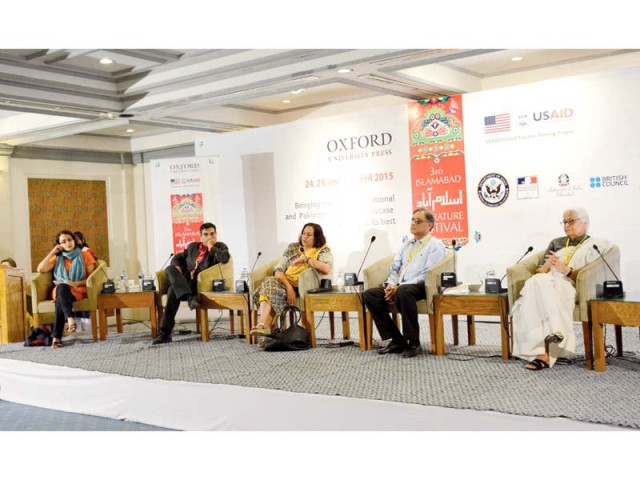Journalism in times of technology
When asked by the moderator to compare the two mediums

Panelists talk about rights activist Sabeen Mahmud, who shot dead on Friday. PHOTO: HUMA CHOUDHARY/ EXRESS
For a country undergoing the 24/7 TV news revolution, the session ‘News, Views and Sensationalism’ was bound to draw a large crowd. With the hall nearly packed to capacity, the session began — albeit with a slight delay and one key participant missing — with newspaper editor Rashed Rahman as moderator and fellow journalists Robin Pagnamenta, Nasim Zehra and Farhan Bokhari as panellists.
The discussion began with Rahman, an experienced journalist, recalling the ‘good old days’ of print journalism. TV journalist Zehra pitched in by reminiscing of her love for print media. She termed the practice of writing “a sacred activity”. When asked by the moderator to compare the two mediums, she said “News changes by the minute in Pakistan and TV has an important position in that scenario. News anchors pilot the emotions and thought process of society.”
Talking about the transition of popular media from print to electronic, Bokhari said that back in the day, the BBC Urdu Service was the only reliable source of broadcast information for the public, but now, “The plethora of channels and the spread of the internet have brought a technological revolution”. He added that people had access to much more information now than a few decades ago.
On a related note, Pagnamenta, who is the South Asia bureau chief for the Times of London, said even in the West, the move from print to digital was a “slow, painful process”.
Discussing the ‘breaking news’ obsession of news channels in Pakistan, Zehra said people demand hard news in today’s day and age.
When asked to explain the ‘ratings phenomenon’ by a participant, she said, “Media owners have started realising that advertisements are now linked with a show’s credibility and not just ratings.” This has led them to revisit their views on ratings, she explained.
Replying to a question about the state of Urdu print media in the country, Rahman said there is a lot of room for improvement in the Urdu press as it is less challenging to popular traditions. However, Bokhari concluded that it was the remote Urdu press’ coverage of important stories from far-off places that highlights major social and political issues and thus lead to national-level coverage by the national media.
The panellists and audience members throughout the session referred to the recent murder of activist Sabeen Mahmud in Karachi and called for a thorough investigation into the killing and unmasking of the perpetrators.
Published in The Express Tribune, April 26th, 2015.



















COMMENTS
Comments are moderated and generally will be posted if they are on-topic and not abusive.
For more information, please see our Comments FAQ